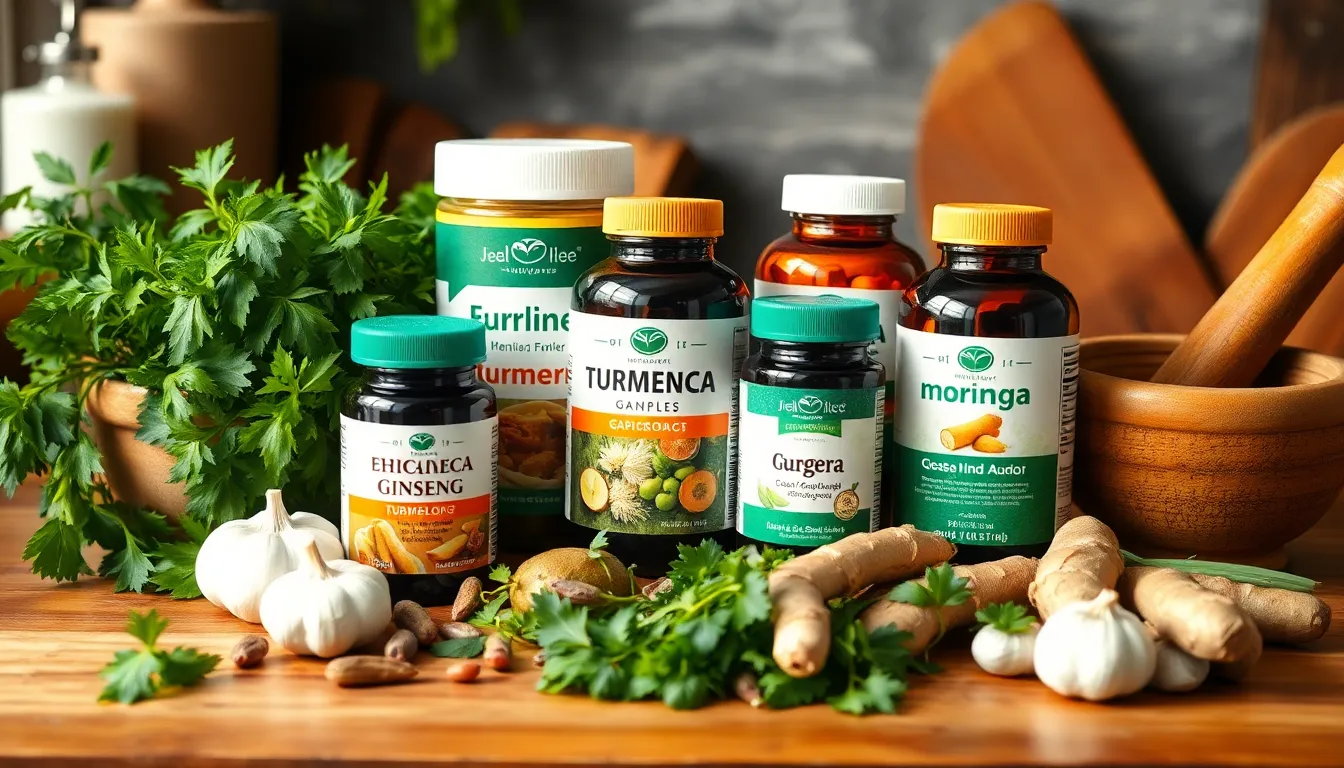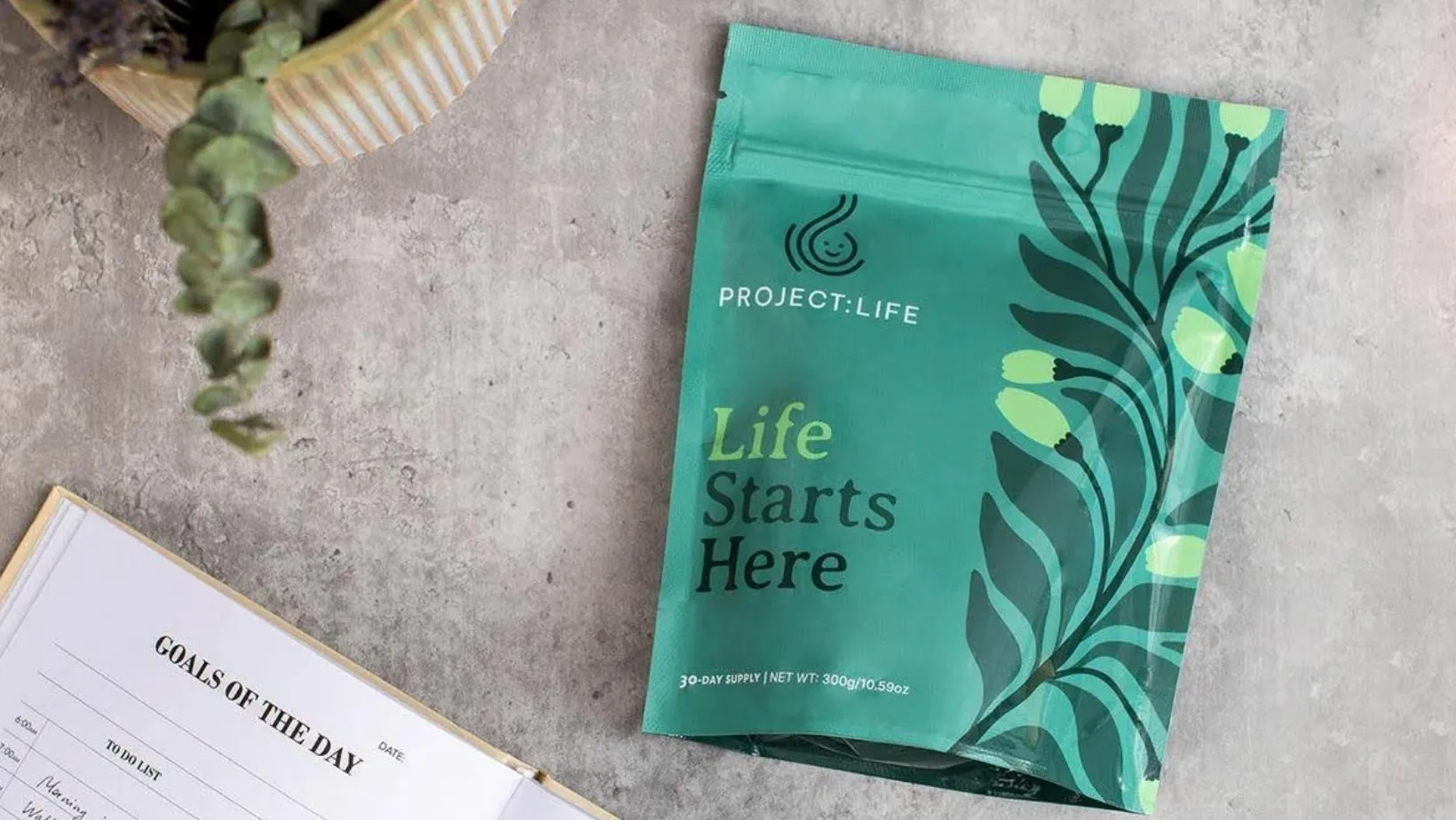Table of Contents
ToggleIn a world where wellness trends come and go faster than a cat video can go viral, herbal supplements stand tall as the wise old sage of health. These little green powerhouses promise to boost energy, enhance mood, and even support immune function—all without the need for a PhD in chemistry. Who knew Mother Nature had such a knack for multitasking?
Overview of Herbal Supplements
Herbal supplements consist of plant-based products used to promote health and wellness. Widely available, these supplements come in various forms including capsules, powders, and teas. Potential benefits include improved energy levels, mood enhancement, and better immune support.
Common herbs like echinacea and ginseng often appear among popular choices. Echinacea supports immune health, while ginseng may boost energy and reduce fatigue. Turmeric contains curcumin, known for its anti-inflammatory properties, making it a preferred option for joint health.
Safety and efficacy remain important considerations. Regulatory oversight varies across regions, so consumers must research products before use. The quality of herbal supplements hinges on sourcing, processing, and manufacturing practices. Trusted brands often provide third-party testing results to verify claims.
Dosage recommendations can differ based on individual health needs and specific conditions. Consulting healthcare professionals before starting any supplement regimen is advisable. They can provide insights into potential interactions with medications or other supplements.
Scientific research continues to expand knowledge of herbal supplements. Studies highlight both benefits and risks, indicating that further investigation is essential for comprehensive understanding. As the wellness landscape evolves, informed consumers will continue to prioritize natural remedies for supportive health benefits.
Types of Herbal Supplements

Herbal supplements come in various categories, each offering unique health benefits. Understanding these categories aids in making informed choices.
Commonly Used Herbs
Echinacea frequently tops the list due to its role in supporting immune health. Ginseng is another popular choice, known for its potential to boost energy and improve focus. Turmeric stands out with its active ingredient curcumin, recognized for powerful anti-inflammatory effects. Garlic often contributes to cardiovascular support by promoting healthy blood circulation. Ginger, often used for digestive health, also helps alleviate nausea. These commonly used herbs not only offer diverse benefits but also provide a solid foundation for natural wellness practices.
Emerging Herbal Ingredients
Adaptogens are gaining attention for their ability to help the body adapt to stress. Rhodiola rosea is an example, known for boosting energy and reducing fatigue. Moringa, often termed a superfood, offers vitamins and minerals that support overall health. Ashwagandha has recently become prominent for its stress-relieving properties. Cordyceps mushrooms are emerging in the wellness community for enhancing athletic performance and endurance. These ingredients showcase the evolving landscape of herbal supplements, offering new possibilities for health enthusiasts.
Benefits of Herbal Supplements
Herbal supplements offer numerous advantages that cater to various health needs. They play vital roles in supporting overall wellness by harnessing the power of natural ingredients.
Health Benefits
Herbal supplements provide a range of health benefits. Echinacea supports immune function and reduces the likelihood of colds. Ginseng aids in boosting energy levels and alleviating fatigue. Turmeric, with its curcumin content, has anti-inflammatory properties and promotes joint health. Garlic contributes to cardiovascular wellness by managing cholesterol levels, while ginger alleviates digestive issues and nausea. Consumers often turn to these natural remedies to enhance their health without relying solely on pharmaceuticals.
Nutritional Value
Herbal supplements possess significant nutritional value. Many herbs are rich in vitamins, minerals, and antioxidants. Moringa offers essential nutrients, including vitamins A, C, and E, along with calcium and potassium. Adaptogens like Rhodiola rosea facilitate stress response, while ashwagandha provides key nutrients that support mental health. These botanical ingredients complement a balanced diet, addressing various nutritional needs and enhancing well-being.
Safety and Risks
Herbal supplements carry potential risks that require attention. Certain individuals may experience side effects, and interactions with medications can pose additional concerns.
Potential Side Effects
Side effects of herbal supplements can vary. Some users report digestive issues, such as nausea or upset stomach, especially with herbs like ginger or garlic. Other reactions include allergic responses, which can occur with echinacea or ginseng. Drowsiness may arise from adaptogens like ashwagandha, impacting daily activities. Furthermore, prolonged use of high doses may lead to more severe complications, including liver damage from kava or increased bleeding risk from garlic. Monitoring one’s body while taking these supplements encourages safety and effective use.
Interactions with Medications
Interactions between herbal supplements and prescription medications warrant close attention. Blood-thinning medications, such as warfarin, may interact negatively with garlic, increasing bleeding risk. Additionally, sedatives may have enhanced effects when combined with sedative herbs, like valerian root. Antidepressants can experience altered effectiveness when paired with St. John’s Wort, potentially leading to serotonin syndrome. Consulting with healthcare professionals before starting any herbal supplement reduces the risk of adverse drug interactions, ensuring safer health management.
Regulation and Quality Control
Regulation of herbal supplements varies significantly by region. In the United States, the FDA does not regulate these products like pharmaceuticals, meaning they don’t require approval for safety or efficacy before hitting the market. Quality control measures differ among manufacturers, leading to variability in product potency and purity.
Third-party testing plays a critical role in establishing trust. Many reputable brands provide evidence of this testing, assuring consumers of their products’ quality and safety. Certifications from organizations like NSF International and USP signify adherence to strict quality standards.
Manufacturing practices also affect the final product. Sourcing herbs from reputable suppliers ensures the absence of contaminants and the preservation of active ingredients. Proper processing, including avoidance of excessive heat or chemicals, helps maintain herbal integrity.
Transparency in labeling enhances consumer confidence. Ingredient lists should be clear, detailing all components and their concentrations. This clarity assists consumers in making informed choices, particularly when considering dosage recommendations or potential interactions with medications.
Monitoring of adverse events remains essential for consumer safety. Reporting systems, while not mandatory, enable users to share experiences, helping to identify potential risks. Continued research contributes to understanding both the benefits and risks associated with herbal supplements, guiding informed use.
Ultimately, awareness of regulation and quality control mechanisms enables consumers to choose effective and safe herbal supplements, supporting their health and wellness journeys.
Herbal supplements continue to capture interest as a natural approach to wellness. Their potential benefits range from boosting energy to supporting immune health, making them appealing to many. As consumers navigate this landscape, awareness of product quality and safety is essential.
Choosing reputable brands that prioritize transparency and third-party testing can help individuals make informed decisions. While the allure of herbal remedies is strong, understanding potential risks and interactions with medications is equally important.
With ongoing research shedding light on the efficacy and safety of these supplements, it’s clear that they’ll remain a significant part of health and wellness discussions. By staying informed, individuals can effectively incorporate herbal supplements into their routines, enhancing their overall well-being.







